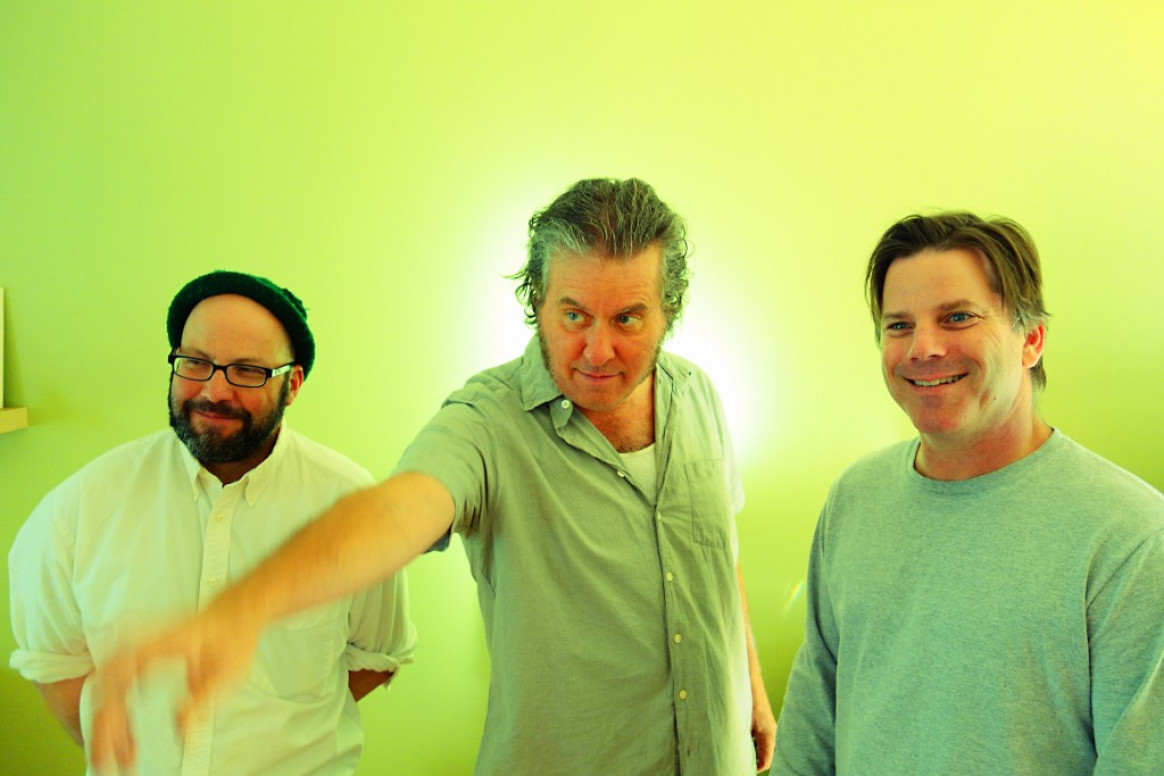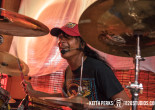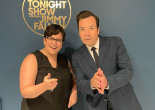For part of his musical career, Mark Mulcahy had lived under the specter of being the frontman for Miracle Legion.
These days, it may be more likely to see him listed as the voice of Polaris, the house band for Nickelodeon’s “The Adventures of Pete and Pete.”
The success of a band that never truly existed has been a welcome surprise to Mulcahy, whose work in various bands has been covered by artists from Thom Yorke and Michael Stipe to The National and Frank Turner. Nearly 20 years after “Pete and Pete” ran its original course, there were no expectations that Polaris could attract an audience, let alone sell out venues like they did during the “Waiting for October” tour in the fall of 2014.
After all, the formation of Polaris – Mulcahy on vocals and guitar, Dave McCaffrey on bass, and Scott Boutier on drums (better known as Muggy, Jersey, and Harris Polaris to fans of the show) was a last-minute addition to the opening sequence of the always-offbeat, now-cult television program.
In a recent phone interview, Mulcahy waxed poetic – as the renowned singer/songwriter is apt to do – about not being able to book the band following a one-off performance in Los Angeles in 2012; how we may never truly know the third lyric to “Hey Sandy;” why Iowa is strange; and revisiting the songs that defined music for a generation of viewers as Polaris prepares for another set of tour dates, the reissue of the album on vinyl for Record Store Day, and a live album release from their set at Lincoln Hall in October 2014.
NEPA SCENE: You’ve built such an impressive body of work over the course of your career, so is it weird for you to still be connected back to a Nickelodeon television program?
MARK MULCAHY: Everything about the last year or so with Polaris, maybe two years, has really been a surprise. We never really took it very seriously, to be honest with you. It was more just a recording band. The record’s always been, I know, kind of popular here and there but it’s been really surprising, man, to play a lot of sold out shows all of a sudden for a band that never played any shows. It doesn’t usually go, that you just start playing and selling out places. [Laughs] It’s been really fun. It’s been great, actually, for a lot of reasons, but, yeah, it’s been a big surprise.
NS: You embraced the joke, too, saying, “Come see the band from your TV!” It seems like you always knew what Polaris was for.
MM: When we started the group, we already had another group. We were in a band that was what we would consider our serious band, or something. The idea of being on a TV show was just a funny kind of unknown. I don’t think it was an idea of theirs right from the beginning to have us even be a character in the show.
I think the open, which is what we’re mostly known for, was one of the last things that they did. And I don’t really think they knew what they were going to do, and then they came up with the idea of us playing the theme song on the lawn the way we did.
Up until then, all it was was me writing songs and recording them for the soundtrack. There was no band, there was no anything, so they said, “Do you guys want to do that?” We kind of said, “Maybe.” [Laughs] Then we said, “Well, maybe we should make up a different name for the band instead of Miracle Legion,” which is what it mostly was. So the whole thing was super accidental and organic and, I don’t know, just random really. It’s been weird.
The whole experience of it is nothing like – you know, I’ve been in a lot of bands in my life – it’s nothing like anything else. I would probably attribute that to that it’s something to do with television, and anything to do with television is just another world. It’s like when you see the weatherman in the grocery store and you get all excited. It’s the weatherman, but because he’s on television, he’s like this other worldly person.
NS: What did you expect when you started planning to take Polaris on the road for the first time last fall?
MM: We didn’t anticipate much, to be honest with you, because when we did the show in California which was the first show we ever played, that was a part of a much bigger thing. It wasn’t really just us. It was us and everybody from the show and, you know, it was really not about us. We were just a part of a bigger thing, which they had done a couple of times. We didn’t do all of them, but the one in Los Angeles was at a big theater and it was kind of a big deal.
After we did that, we said, “Look how much fun that was,” and we tried to get some shows. We couldn’t get any. Somehow, this time around, two years later, somehow it was a much different thing. It probably illustrates some truth to the idea of timing. Somehow, this time the booking agent found a bunch of people that really wanted to book it, and they were smart because they really wanted to book something that a lot of people wanted to see, I guess. I really don’t know why it’s working out so well. I just think it’s just a good moment in time to do it.
NS: You definitely hit the nostalgia vibe hard, but you played some unusual covers along the way – “Man on the Moon” and “I Don’t Want to Live on the Moon” from “Sesame Street” of all things come to mind. Why were they chosen for your live sets?
MM: We sort of got into a space theme. Polaris has always had kind of something to do with outer space and rockets. So, the covers we chose were “moon” covers, not for any particular reason. We played a gig in Chicago – I was just listening to it – we recorded this one gig we did and it turned out so great, those are all on it. So, we’re going to do a live record which is also kind of crazy. The covers are on this record that we’re going to do, “Live at Lincoln Hall.”
 |
NS: That Chicago show had an art exhibit organized by Consequence of Sound. Is it strange to see how the show and the music have inspired artists in different forms of media?
MM: I don’t know if I’m qualified to know that. I would give the credit for any of that more to Will [McRobb] and Chris [Vascardi], the guys who invented the show, because they had a real idea that they wanted to get across. Again, lucky for them, not that I’m an expert on how it works at Nickelodeon, they were pretty much left alone to do what they wanted to do. They really got to do a great thing which is present a vision of somebody without a lot of watering it down. There wasn’t a lot of people saying, “No, you need to change this,” and “This is no good,” or “We want this bit this way.” All of the guest stars were their idea, all of the music was their idea, all of the writing, all of the jokes – everything was really coming from two guys. You’re going to get something good out of that.
Whatever influence that has caused on anybody else would really be all praises to those two guys. They had a great idea. They were pretty new to the thing, they were just going by their own instincts. Instinct is a great artistic motivator, you know. Whatever I did, I have no idea. It would be all their idea that I did it. Even the songs, I wrote the songs with Will telling me what he wanted. It wasn’t like I wrote them and said, “Here they are, good luck.” I would write songs, and he would say, “That one’s no good,” or “This one is great,” or whatever. He was really involved in a lot of things.
NS: The show creators have summed up “Pete and Pete” in four words: funny, sad, weird, and beautiful. Do you think those terms apply to the music of Polaris?
MM: In terms of what he asked for, yes. In terms of what the song sounds like, yes. In terms of what it’s about, I don’t know that I always wrote lyrics that he would either approve of or want me to write. I wrote lyrics that I wanted to write, mostly, and they were kind of – maybe I wouldn’t have written them if it wasn’t for that particular use or show or whatever. I might have just written something different. But, yeah, I think something like that, but then my version of that, at least in terms of the music. It was my version of his idea of that, I suppose.
I felt like I really worked well with him. He and I are still great friends. He and I got along really well. I liked working with him, because I’ve done other things where you work with people and they don’t really know what they want, or they want something and then they want something different. It changes a lot, whereas he and I seemed to sync up pretty well right from the get-go.
NS: It’s like “Waiting For October.” How on Earth did you get a song about a cult’s end-of-the-world prediction into a kids’ TV show?
MM: That’s what I’m saying! It’s like the music defies that. There’s a disconnect in the music. In Miracle Legion, we had a song called “Snacks and Candy,” which is about the murder of a little boy. You expect the music to suit the lyrics, but sometimes it doesn’t quite work that way.
Something like “Snacks and Candy,” sometimes I wish that the music was more to the point of what the song’s about. Then it doesn’t sound so happy. I don’t know that I like doing that as much as I maybe used to like doing that. “Waiting for October,” even though it’s a happy song – it’s not even so much that it’s about the end of the world. It’s about these insane people that think it’s the end of the world. To me it was funny.
NS: I’m glad you brought up “Snacks and Candy” because it feels like a Miracle Legion song that could have been reused as a Polaris song. Was there a reason you didn’t recycle any of your other work for the show?
MM: I don’t think anybody wanted us to. Part of kind of hiring someone to do all the music is so that you can access it easier when you have a certain ownership of it. They wanted to have their own music. All the other music they used – all of The Magnetic Fields and whatever else – you have to jump through a lot of hoops to be able to use that music. So, for me, all of the other music I have written is part of something else, whereas the music I wrote for them was strictly for them. It was great, man; it was a great job. For three years I had that job, and I really enjoyed it.
NS: Do you have a favorite backstory behind a Polaris song?
MM: I’d have to look at all of the titles and see if I can remember what happened. A lot of it, I just remember sort of being in a room – actually, I remember being in a room at my mom’s house and really not knowing what I was doing for the first year, then the second year knowing what I was doing but trying to recreate what I had already done. Then, the third year, just really struggling to find new ways to do the same thing. I think of the whole thing as more than one song because, it’s really, “Here are the types of songs we want,” and inside that you try to do the same thing differently. I’d say three years was probably it, for me; a fourth year would have really been a struggle.
That’s what’s great about things that come and go. They don’t fade, they don’t get worse, they don’t have a bad period. They just have… it’s all kind of forward moving. You see some people like Ricky Gervais who just, like, do one season or two seasons, not try to do 10 seasons of something, you know? I think that’s nice. That’s a hard thing, just moving on to something else. Moving forward turns out to be what it’s all about.
NS: I’d be remiss if I didn’t ask you about “Hey Sandy.” You created that song before Polaris really ever existed, right?
MM: I did, yes. When he asked me for the theme song in our first meeting, that’s kind of, I guess, in some ways that’s how I got the job. He asked, “Can you write a theme song? Because that’s our most important thing.”
And he’s talking to me, and it was almost like an episode where they’ll put the camera on the guy’s mouth and he’s talking and the other guy’s trying to, like, stare at the mouth and figure out what’s being said. I’m just staring at his mouth going, “Oh, my God, I don’t know how to write a theme song.” [Laughs] Just because it’s… writing any song is fine, but writing this very specific song is different.
And then I’m watching his mouth and he goes, “We don’t want it to say anything about ‘Pete and Pete’ in it,” which possibly would have been the easiest way to go. I mean, “Hey, hey, we’re The Monkees,” there’s an easy song to write. “Cheers” is a different matter. Even when he was talking, I had this song that I recorded a while ago. Anyway, I sent it to him. I just sent him the one song. I didn’t send him three choices or anything. I sent him that and I just waited and, boom, he just loved it right away. That was lucky for me. Even though it’s nothing quite like, the version I gave him isn’t much like, the one I gave him really sounds more like a They Might Be Giants song, I think. It was just really lucky for me. Really, I was very nervous about trying to write something quite as exacting as the theme song of a TV show. It was just really lucky for all of us because it turned out to be something that people really relate to.
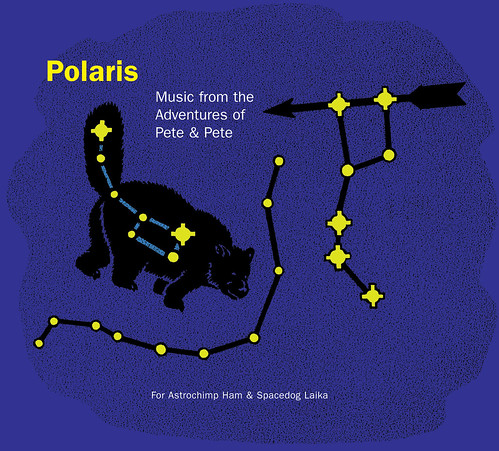 |
NS: Have you ever thought about what he might have picked if he hated “Hey Sandy?”
MM: No. That episode ended in my head. Recording it was a different thing. Recording it took a little time because he wanted this and that and he wanted this shorter or longer. It was a little more complicated to actually get it to where it was, but doing it was easy.
NS: The song has one of the most widely debated lyrics because of that fabled third line. Do you think you’ll ever truly reveal what it is?
MM: Well, it’s one of the very few secrets that I have. I’d like people to know. It’s one of those things where it’s like, “Man, I wish somebody knew that besides me.” But so far, no, I haven’t told anyone. I haven’t told my closest friend. I don’t know what it is. It’s something that, it gets like a snowball and just keeps rolling down the hill.
I will say one thing: No one is right. Nothing that anyone has guessed is right. I’ve said that before, so I don’t mind saying that again. But, you know, eventually no one’s going to care so. I don’t know if I want to take it to my grave. Maybe I do.
NS: “In final words, Mulcahy reveals ‘Hey Sandy’ lyric.”
MM: It’ll be like the “Seinfeld” episode where she says “Bosco” at the end. [Laughs] “Bosco!”
NS: Was there anything that you wrote for Nickelodeon that you’ve repurposed in your solo work since then?
MM: Yes, but I don’t know what. I’m sorry. I wish I could, there’s probably three or four songs that I turned in to Will that he didn’t want. I still liked them. But I don’t know what songs they are. I have to look at these tapes I have. Maybe two or three or four.
NS: You’ve been performing with J Mascis from Dinosaur Jr. recently. Is there any act that you would like to collaborate with, either as a solo artist or through Polaris?
MM: That’s a great question. I wouldn’t mind rehearsing with J. I don’t know if that’s his band or not, but we had a really fun couple of days. That’s a great band. I don’t know. Man, that’s a great question. I should think of that. I don’t know.
I think about people all the time. I thought about working with Jeff Lynne, the guy from Electric Light Orchestra. I just heard a couple of songs that he did, and I was like, “Wow! This guy is so good.” That’s highly unlikely, but, you know.
Really, in the last year, I really turned myself on to Paul McCartney more than I ever thought. The guy is just an incredible force of music, you know. These are just high-end dreams. I don’t really have anyone I can think of other than my friends around here that I like playing with. Elvis Perkins, you ever listen to that guy’s stuff? He’s great.
NS: What’s it been like to revisit this music and see it remastered for a reissue on vinyl for Record Store Day on April 18?
MM: Oh, man. That’s something I wish I had done. I wanted to do it, I just wanted to do it for a really long time because I just think that music suits vinyl. Sometimes it maybe doesn’t, but that one really does. The first record I made on my own was called “Fathering” and I just got a notion to do that. I really wanted to do that, too, because that was recorded on tape and everything about it was like, “Please put my on vinyl.” [The 1997 album was reissued in 2014 on vinyl.]
Record Store Day works in a way where they buy a lot of records right off the bat. You can sell records to them and then that helps pay for the cost of making the records. Vinyl costs a ton of money to make. It’s completely absurd that a record sells for $20 or $25. That’s insane, but it’s because it costs just so goddamn much to make them. There’s printing and pressing, and all the pressing plants closed because vinyl dies out so now there’s only a small amount of places to make them. Maybe for a record label it’s not such a big deal, but for a small record label like what I have it’s a big thing. So Record Store Day kind of allows you to kind of make the record and then hopefully get some of the money back so you’re not just in the hole.
Anyway, I’m really happy it got remastered. I think it sounds quite a bit better – maybe not to somebody else – but it sounds a little thicker and nicer. It’s just nice to put a record on, you know? If you want to hear music, for me, it feels great to put it on that way. The listening process is different. The sound is different, obviously. The ritual of it is something that I’m used to. Just the idea of listening to Side A and Side B, that’s something that requires some level of patience, some level of involvement. It isn’t just a thing that you put on random or shuffle, which are things that are normal when you listen to music today which I’m not saying are wrong or bad.
There’s a unique – it’s almost like going to the movies to put a record on. You went to the movies and you sat there for two hours and you weren’t going to do something else and you didn’t answer the phone, you didn’t pause it. Everything about it involves the person listening to it more than other ways of listening to music is what I’m saying.
NS: Do you feel there is more pressure to make singles that can sell or make strong albums?
MM: I think the advent of recorded music was based around singles and not albums, then it became albums and that’s for, whatever, 30 years or something it was album-based. Now, it’s maybe not so much. But I hope that they both can survive.
I personally like to put out a batch of songs that somehow maybe go together or are recorded in some way. It’s more about when you’re making the album, too. You have these bunch of songs that somehow in your mind you connect to go on an album. The creation of it is just nice. Like the last record I made on my own was done one song a day and we had a certain way of doing it. That’s the event really. The music is part of the event of making this thing. I like that. I would love to make singles somehow. I just don’t know how to do that. I never did that so I don’t really know, it’s not part of my way of doing things.
I remember when digital first came in and downloads and whatever, and Dr. Dre was talking about just releasing a song a week and selling it for $0.99 or something. He was talking really small and saying if I sell 2,000 or 3,000 of those a week, and I thought, “Man, that is genius.” [Laughs] Making $3,000 a week would be really sweet. That would be a sweet paycheck just for writing a song and putting it out. I always thought it was a great idea. I don’t know if anyone could actually do that or does that.
NS: Last year’s tour obviously had its high points, but what was the strangest thing you experienced last fall?
MM: Oh, man. Probably Iowa.
NS: The whole state?
MM: In good ways. I haven’t really spent a lot of time in Iowa. We used to play in Iowa City a little bit, which is a college town so it wasn’t that abnormal. But this was way down the road. We played this place called Codfish Hollow [in Maquoketa, Iowa] that was just way down the dirt road out in the corn field past the nothing. The town was from the Dust Bowl. It was just a weird and great thing but certainly off the beaten path by a lot.
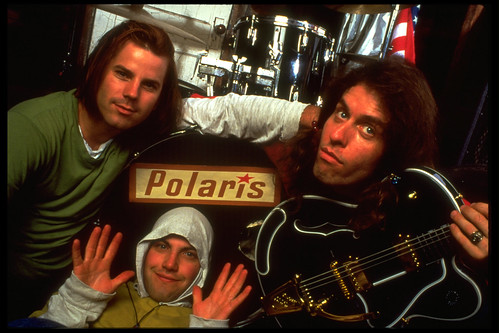 |
NS: You’re heading out again beginning in April. Is there any venue or town you’re looking forward to?
MM: I always look forward to L.A. which is great, but I haven’t really been much to Seattle and Portland so, and Spokane which we’re going there and I’ve only been there once. The places I’ve never been to often or played much, I look forward to knowing a little bit more. For me, I just love going to L.A. That’s always a treat.
NS: You’ve obviously connect to fans of the show on some level. What do you hope they walk away from this live experience with?
MM: To be honest, just because we’ve enjoyed doing it so much, playing with the guys that I’m playing with, who I used to play with for many years and didn’t play with for a long time, I’m getting my own reward from that. I think we thought we were just going to do it a couple of times. Any part of doing any of it was built around just one show. We were going to do one show. That’s how it started. I just think that we would like to do it again. We would like to do it more.
If people come to it and like it, then maybe in a year or two we can do the whole thing again in kind of the same towns. It’s kind of only in the same towns that we can do it because it has to be cities, it has to be kind of bigger places. It’s hard to do it in a little town because there just aren’t enough kind of people.
What I hope is that they like it and want to see it again in a year and a half or something. And maybe, somehow, we’ll make another record. I just hope it can go on a little bit because it is really fun. There’s no pressure to do anything other than this thing that everyone loves, so it’s not very hard.
NS: It’s like what you said about things ending before they have a bad period. Does this feel like it can go on kind of indefinitely or however you want it to?
MM: I hope so. I know the Pixies and I know J, too. I know both of them are just doing nothing and they just got those bands going. Now they can just do whatever they want. A lot of bands have regrouped, and we didn’t really regroup because we never actually grouped. I’d like to think that we can just do whatever we feel like doing. Nothing is not enjoyable about doing it. That’s rare.
NS: Any chance that you’ll ever play in Scranton?
MM: I have this theory. I think that the ticket price for Polaris is a little bit high. But that’s what it has to be. Otherwise we can’t do it. I think places like Scranton and Northampton or whatever, they’re going to start getting squeezed out of shows because people – in New York you can afford to pay $20 to go, no problem, because that’s just no big deal. But I think in Scranton, you’re probably going to go to that show and then not go to the other show. I just think a lot of these little towns are going to get squeezed out of the shows that they might’ve used to get. It just costs too much to go on tour, you know?
The Polaris tour rolls on this month and continues through mid-May.
Polaris tour dates:
- April 16: Boston, MA @ Brighton Music Hall
- April 21: Spokane, WA @ The Bartlett
- April 22: Seattle, WA @ The Crocodile
- April 23: Portland, OR @ Aladdin Theater
- April 24: San Francisco, CA @ The Chapel
- April 25: Los Angeles, CA @ The Echoplex
- May 9: New Haven, CT @ College Street Music Hall
- May 15: New York, NY @ Highline Ballroom
- May 16: Philadelphia, PA @ Underground Arts
Read a review of Polaris’ last sold-out performance in Philadelphia here.
with Rocket & The Ghost
Location: Highline Ballroom (431 W. 16th St., New York, NY)
Date: Friday, May 15
Time: Doors at 5:30 p.m., show at 7:30 p.m.
Cost: $22 in advance; $24 at the door
with Shark Tape
Location: Underground Arts (1200 Callowhill St., Philadelphia)
Date: Saturday, May 16
Time: Doors at 8 p.m., show at 9 p.m.
Cost: $18 in advance
by Chris Hughes
Chris is a busy husband, dad, and aspiring professional geek. He lives, works, and plays in Scranton, Pennsylvania.

